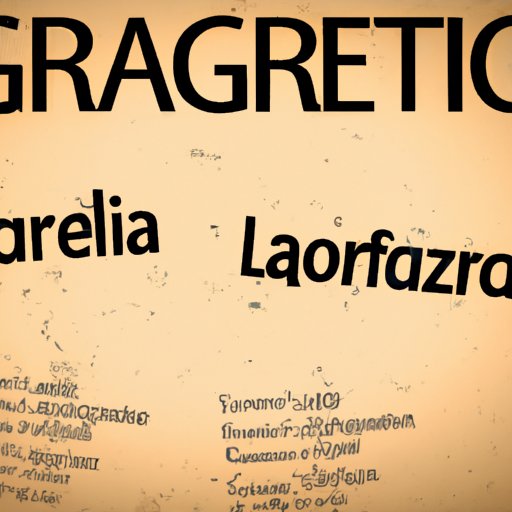
Introduction
Learning how to say “free” in Spanish is an essential part of becoming fluent in the language. Whether you’re traveling to a Spanish-speaking country or simply trying to communicate with Spanish-speaking friends, knowing how to say “free” is crucial. In this article, we’ll explore different ways of saying “free” in Spanish, including common words and phrases, nuances of meaning, and practical tips for using these words correctly.
7 Common Ways to Say Free in Spanish
Here are seven common words and phrases for “free” in Spanish:
- Gratuito/a: This is the most formal way to say “free” in Spanish. It is often used for things like free trials or complimentary gifts.
- Gratis: This is a more casual and commonly used word for “free” in Spanish. It can also be used to refer to something that is without charge.
- Cortesía: This word means “courtesy” in Spanish, but it can also be used to refer to a free item or service provided as a gesture of goodwill.
- Regalo: This word means “gift” in Spanish, and can be used to refer to something that is given free of charge.
- Muestras gratis: This phrase means “free samples” in Spanish, and is commonly used in marketing and advertising to offer customers a chance to try a product without paying for it.
- Sin cargo: This phrase means “without charge” and can be used to say something is free of cost.
- Sin costo: This phrase is similar to “sin cargo,” and also means “without cost.”
Unleashing the Power of “Gratis”: How to Express Free in Spanish
“Gratis” is one of the most commonly used words for “free” in Spanish, but it’s important to understand its nuances and when it’s appropriate to use it. “Gratis” is a straightforward way of saying something is free, but it can also suggest that the item or service isn’t necessarily high quality. For example, if someone offers you “algo gratis” (something for free), you might assume it’s not the best quality.
In general, it’s best to use “gratis” for casual situations or when something is completely free of charge without any strings attached. For example:
- “La entrada es gratis” (The entrance is free)
- “Te regalo este libro gratis” (I’m giving you this book for free)

The Essential Guide to Using “Libre” and “Gratuito” in Spanish
While “gratis” is the most commonly used word for “free” in Spanish, “libre” and “gratuito” each have their own unique meanings:
- Libre: This word is most commonly used to mean “free” in the sense of being unrestricted or unencumbered. For example, “habla libremente” means “speak freely.”
- Gratuito: As mentioned earlier, this word means “free” in the sense of being without cost or charge.
It’s important to use these words correctly to avoid confusion. For example, if you want to say something is “free to use” or “free from restrictions,” use “libre.” If you want to say something is “free of charge,” use “gratuito.”
Free Your Vocabulary: Learn How to Say Free in Spanish
Here are some additional vocabulary words for “free” in Spanish:
- Sin costo adicional: This phrase means “without additional cost.”
- Sin coste: This phrase is similar to “sin costo” and means “without cost.”
- Algo de balde: This colloquial phrase means “something for free” or “on the house.”
- Promocional: This word means “promotional” in Spanish, but can be used to refer to a free item or service offered as part of a marketing promotion.
- De cortesía: This phrase is similar to “cortesía” and means “as a courtesy” or “as a goodwill gesture.”
From “Sin Costo” to “Gratis”: Different Ways to Say Free in Spanish
Here’s a comprehensive list of other words and phrases for “free” in Spanish:
- Gratis
- Gratuito/a
- Sin cargo
- Sin costo
- De forma gratuita
- Absolutamente gratis
- De gratis
- Como regalo
- Un obsequio
- Como cortesía
- Por la cara
- Para nada
- Algo de balde
- Palos de ciego
It’s important to use the appropriate word or phrase for the situation to ensure you’re communicating effectively in Spanish.
Mastering Free in Spanish: A Comprehensive Guide
Learning how to say “free” in Spanish can be challenging, but with practice and perseverance, you can become fluent in using these words and phrases. To help you remember them, try using flashcards or practicing with a friend or language partner.
Here’s a quick summary of the different ways to say “free” in Spanish:
- Gratuito/a: Most formal way to say “free.”
- Gratis: Casual and commonly used word for “free.”
- Cortesía: Can be used to refer to a free item or service provided as a gesture of goodwill.
- Regalo: Means “gift” and can be used to refer to something that is given free of charge.
- Sin cargo: Means “without charge” and can be used to say something is free of cost.
- Sin costo: Similar to “sin cargo” and also means “without cost.”
- Libre: Means “free” in the sense of being unrestricted or unencumbered.
- Gratuito: Means “free” in the sense of being without cost or charge.
Unlocking the Secret of “Free” in Spanish: Tips and Tricks
Here are some practical tips and tricks for using “free” in Spanish:
- Pay attention to context and use the appropriate word or phrase for the situation.
- Remember that “gratis” can also suggest low quality or lack of value, so use “gratuito/a” in more formal situations.
- If you’re not sure which word to use, stick with “gratis” for casual situations and “gratuito/a” for formal ones.
Conclusion
Learning how to say “free” in Spanish is an important part of becoming fluent in the language. By familiarizing yourself with different vocabulary words and phrases for “free,” you’ll be able to communicate more effectively with Spanish-speaking friends, colleagues, and customers. Remember to pay attention to context and use the appropriate word or phrase for the situation, and practice regularly to become a confident Spanish speaker.




